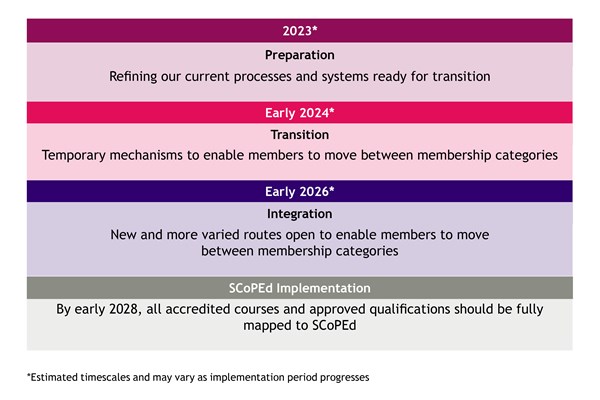Here you can find answers to some commonly asked questions about SCoPEd – this page focuses on the SCoPEd implementation period.
1. What is the implementation period?
2. What is the transition period?
3. What is the integration period?
4. Why is there a two-year transition period instead of implementing changes when everything is ready?
5. After the transition period will I still need to apply for accreditation to move membership categories?
6. What will the routes be after 2026?
7. As the SCoPEd framework references work with adults, does the restructuring of the membership categories still apply to those not working with adults?
8. Will there be grandparenting based on years of experience?
9. Why am I in column B if I already have Level 7 qualifications in counselling and psychotherapy?
10. Will BACP members be able to evidence column C competences and have comparable status to UKCP or BPC members, who have historically been seen as having a superior status?
11. I’m accredited with another SCoPEd partner, do I also need to be accredited with BACP or may I continue as a registered member?
12. I’m in a different column with another SCoPEd partner, can I be transferred to the same SCoPEd column with BACP?
13. I'm a registered member and I meet the criteria to apply for senior accreditation, can I apply directly for this membership category or do I need to apply for accredited membership first?
14. I’m an accredited member and I meet the criteria to apply for senior accreditation, should I apply now of wait until the new routes open in February 2026?
15. Will my employment be affected if my membership category changes from senior accredited to accredited?
16. I recently completed my senior accreditation. As I will no longer be able to use this title, will I get a refund?
17. Will column titles be added to the framework?
18. Can I continue to use the title (e: g counsellor or psychotherapist) I’m currently using?
1. What is the implementation period?
BACP’s SCoPEd implementation takes place across three carefully planned stages – preparation, transition and integration. Preparation is now complete and we entered the transition period in February 2024. This will last until early 2026 and then we’ll enter the integration stage.
SCoPEd implementation timeline

2. What is the transition period?
This stage started in February 2024 and will last until early 2026. During transition we’ll:
- open new, temporary accreditation application mechanisms that will enable members to move to accredited membership (column B) and senior accredited membership (column C).
- finalise new permanent accreditation routes and aligned membership entry requirements.
Members will be able to move membership categories via the new temporary mechanisms where they can evidence the skills, training, knowledge and experience to do so.
3. What is the integration period?
We anticipate this stage will start in early 2026. At this time:
- BACP membership category entry requirements will be fully aligned with SCoPEd framework columns A, B and C
- additional and permanent accreditation routes, mapped to the SCoPEd standards and competences of columns B and C, will open, enabling members to move membership categories should they wish to
- new accreditation routes will reflect training and experience gained through practice and CPD
Courses may need longer to integrate any changes into their training programmes and will have until early 2028 to complete this process.
4. Why is there a two-year transition period instead of implementing changes when everything is ready?
We want to give eligible members the opportunity to move membership categories as soon as possible, if that’s what they’d like to do. The transition period enables us to do this.
It will enable members, where they have the relevant skills, knowledge, training and experience, to apply to move membership categories while we get all the new accreditation schemes and routes ready, ahead of the new permanent accreditation schemes opening in early 2026.
5. After the transition period will I still need to apply for accreditation to move membership categories?
The process for moving membership category after the transition period will still be a form of accreditation, but there will be different and new routes opening from 2026. These will include routes that take into account CPD, experience and training and will enable movement between all membership categories aligned to SCoPEd framework columns A, B and C.
6. What will the routes be after 2026?
Additional new accreditation routes to move between all membership categories will be available from early 2026. They’ll consider training and CPD alongside other existing skills, knowledge and experience.
These routes are currently being finalised as they are more complex than the routes that we’ve agreed with partners for the transition period.
As soon as we have more information, we'll communicate the details with members.
7. As the SCoPEd framework references work with adults, does the restructuring of the membership categories still apply to those not working with adults?
Yes, all our membership categories are aligned to the SCoPEd framework. This includes members who completed core practitioner training courses for working with children and young people (CYP).
Members who have completed core training to work with CYP will meet the standards of at least column A of the SCoPEd framework, however, their training will look at these competences with consideration of how these are applied in CYP practice.
These courses are also likely to cover additional competences in relation to CYP practice that are not addressed in the SCoPEd framework. You can see examples of the types of competences that CYP core training courses would cover in addition to SCoPEd competences in our CYP competence framework.
8. Will there be grandparenting based on years of experience?
Grandparenting is usually a temporary exemption for individuals within existing systems when changes come into operation. Our transition period offers a form of grandparenting in that we’ll be offering streamlined accreditation processes before SCoPEd is fully integrated.
When the transition period ends in early 2026, new routes to accreditation will open. This will include routes that consider CPD, experience and training and will enable movement between all membership categories (SCoPEd framework columns A, B and C).
9. Why am I in column B if I already have Level 7 qualifications in counselling and psychotherapy?
If you’re already an accredited member and hold a Level 7 or equivalent counselling or psychotherapy qualification, you may be eligible to apply for senior accreditation during the transition period.
A Level 7 counselling or psychotherapy qualification is not the only eligibility criteria for senior accreditation during the transition period. To meet the SCoPEd framework column C requirements, you need to provide evidence that you’ve undertaken 160 hours of personal therapy or personal development work that has contributed to your self-awareness which is applicable to your therapeutic practice.
You’ll also need to complete a personal statement in relation to criteria that have been derived from the column C SCoPEd framework competences.
Level 7 courses vary widely – some are predominately research focused and others have greater emphasis on practitioner development. It’s therefore not possible for us to determine which competences you have attained through your Level 7 course.
Accreditation has always been the mechanism we use to determine whether our members meet the eligibility and reflective practice criteria, so updating these schemes is the least disruptive way to do this. Accreditation is a fair and robust process that is well recognised across the profession for upholding standards.
10. Will BACP members be able to evidence column C competences and have comparable status to UKCP or BPC members, who have historically been seen as having a superior status?
Yes, therapists who are in membership categories aligned to column C of the SCoPEd framework will have all met the minimum standards of that column and can be comparable in this respect.
The SCoPEd framework sets out the minimum standards required for partners to align their membership categories to. Some SCoPEd partners may also require additional criteria to meet their own membership category standards.
11. I’m in column B with another SCoPEd partner, do I also need to be accredited with BACP or may I continue as a registered member?
No, it’s your choice if you wish to become accredited with us and you can continue as a registered member. When advertising you’re a BACP registered member, you can also reference your alignment to column A of the SCoPEd framework.
If you’re a member of another SCoPEd partner organisation and you’re aligned to a different column of the SCoPEd framework with them, you can reference that alongside that partner’s membership category, not ours.
12. I’m in a different column with another SCoPEd partner, can I be transferred to the same SCoPEd framework column with BACP?
If someone wishes to join more than one membership body, they need to satisfy the criteria of each membership body, as they currently do.
The framework sets out the minimum standards for each column that the membership categories are aligned to. Some partners may have additional criteria relating to their own requirements which you must meet, but the SCoPEd standards will be equitable. Some partners may also accept members and registrants who already meet the requirements from other partners. We’ll be discussing this with partners and will update members in due course.
If you are a BACP accredited member or senior accredited member and also a UKCP or BPC member and are aligned to column C of the SCoPEd framework with one of those partners - please contact our customer services team for more information about the process for you to move to our revised senior accredited membership category, if you wish to.
13. I'm a registered member and I meet the criteria to apply for senior accreditation, can I apply directly for this membership category or do I need to apply for accredited membership first?
If you want to move from being a registered member (column A) to a senior accredited member (column C) during the transition period, you’ll need to become accredited before applying for senior accreditation.
We’re currently working on routes to enable members to move directly from registered membership to senior accredited membership and will inform members of the details in due course.
14. I’m an accredited member and I meet the criteria to apply for senior accreditation, should I apply now or wait until the new routes open in February 2026?
It’s important that you feel ready to apply for senior accreditation when you prepare and submit your application. Whether that is during the transition period or after will depend on your readiness to go through this process. You won’t be disadvantaged either way.
15. Will my employment be affected if my membership category changes from senior accredited to accredited?
You’ll still be able to provide all the services you currently do. You’ll still be able to practise competences in other SCoPEd columns providing you have the right skills, knowledge, training and experience to do so. This is in line with our existing Ethical Framework, which states that BACP members must work within the limits of their competence.
16. I recently completed my senior accreditation. As I will no longer be able to use this title, will I get a refund?
No, a refund won’t be available. Current senior accredited members can apply for the column C aligned senior accredited membership category for free during the transition period if they have a Level 7 or equivalent counselling and/or psychotherapy qualification and meet the other eligibility requirements.
If they don’t have a Level 7 or equivalent qualification they can apply via the additional route opening in 2026, which will include recognition of CPD and experience. This route will be free to current senior accredited members until February 2027.
17. Will column titles be added to the framework?
The framework will be implemented using the column titles A, B and C. In the future, the partnership may consider changing these titles, but work on the titles would not be about identifying or creating protected titles. It would be about ensuring consistency and reducing confusion across the profession.
18. Can I continue to use the title (e: g counsellor or psychotherapist) I’m currently using?
Yes, the ‘title’(e: g counsellor or psychotherapist) a member uses is dependent on the individual’s training, qualifications and experience. Many qualifications stipulate whether it is a counselling or psychotherapy award, and some may also include the modality. As always, members should work within their competence and not mispresent their training or qualifications. These titles are different to partners’ membership categories that are aligned to the SCoPEd framework.
Contact us
Please contact customer services if you have any further questions.
Related links

SCoPEd
The SCoPEd framework is a ground-breaking shared standards framework, developed by six Professional Standards Authority accredited bodies, including BACP, which represent over 75,000 counsellors and psychotherapists

SCoPEd frequently asked questions
Answers to the most commonly asked questions about SCoPEd

SCoPEd framework
Read the January 2022 version of the SCoPEd framework
